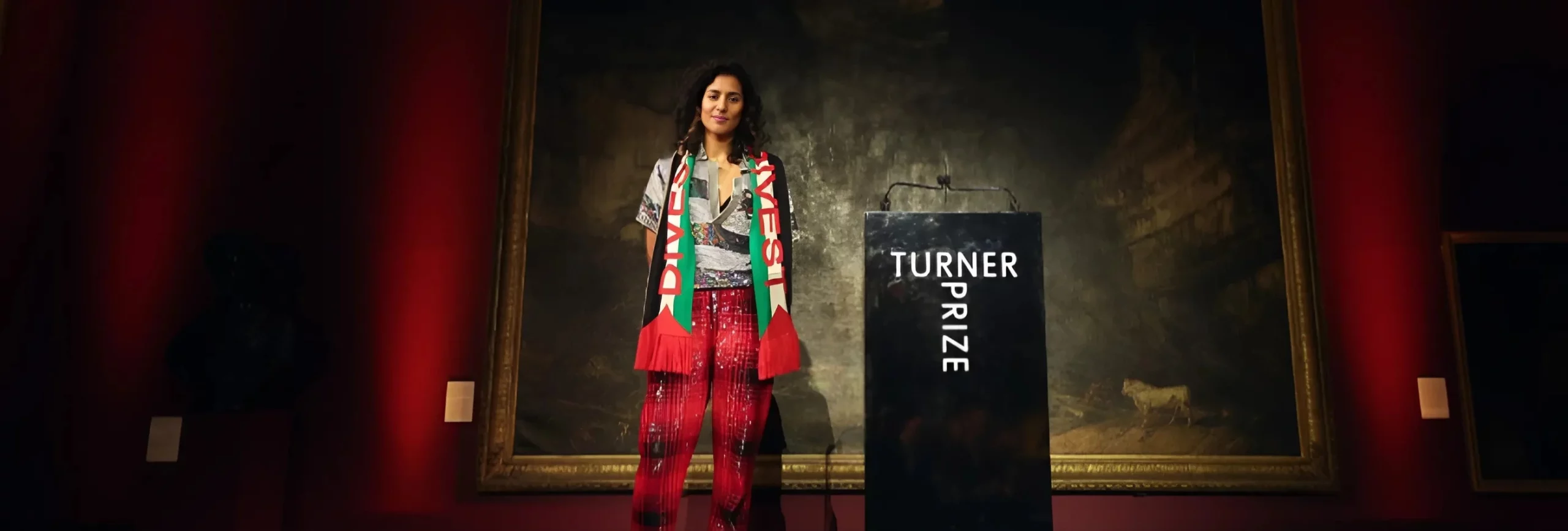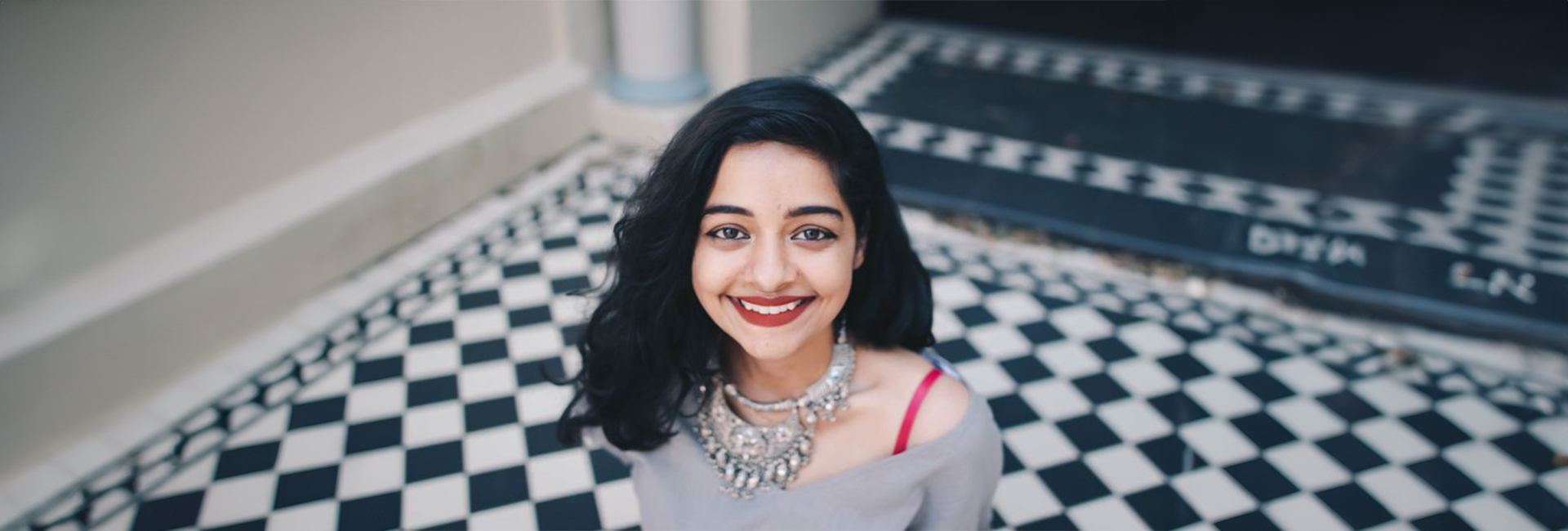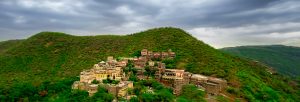(December 13, 2024) In the 1950s, amidst the turbulence followed by India’s Partition, Jasleen Kaur’s great-grandfather left Punjab to seek a new beginning in Glasgow, Scotland. Decades later, his great-granddaughter, Jasleen Kaur has carved her place on the global art stage by winning the 2024 Turner Prize—one of the art world’s most prestigious honours, named after Britain’s celebrated artist J. M. W. Turner and awarded annually to a British national. With her standout installation Alter Altar, Jasleen earned this coveted accolade and a prize of $32,000. The 2024 Turner Prize celebrates its 40th anniversary. Each year, four artists are shortlisted, with one ultimately chosen as the winner. This year’s nominees included Claudette Johnson, Pio Abad, and Delaine Le Bas.
The Scottish Sikh artist’s journey is deeply rooted in her family’s migration story. Jasleen Kaur has a unique ability to weave everyday objects, cultural memory, and sociopolitical commentary into thought-provoking art. Born in Glasgow to Sikh parents with roots in Punjab, Jasleen’s work exemplifies how personal and cultural histories shape artistic expression. “I was brought up in a very religious Sikh family in Glasgow and although my work is not hugely autobiographical it is about meeting points,” she shared in an interview. “I do think of myself as a cobbler. I pull together unlearned and culturally acquired knowledge in my work,” she added.
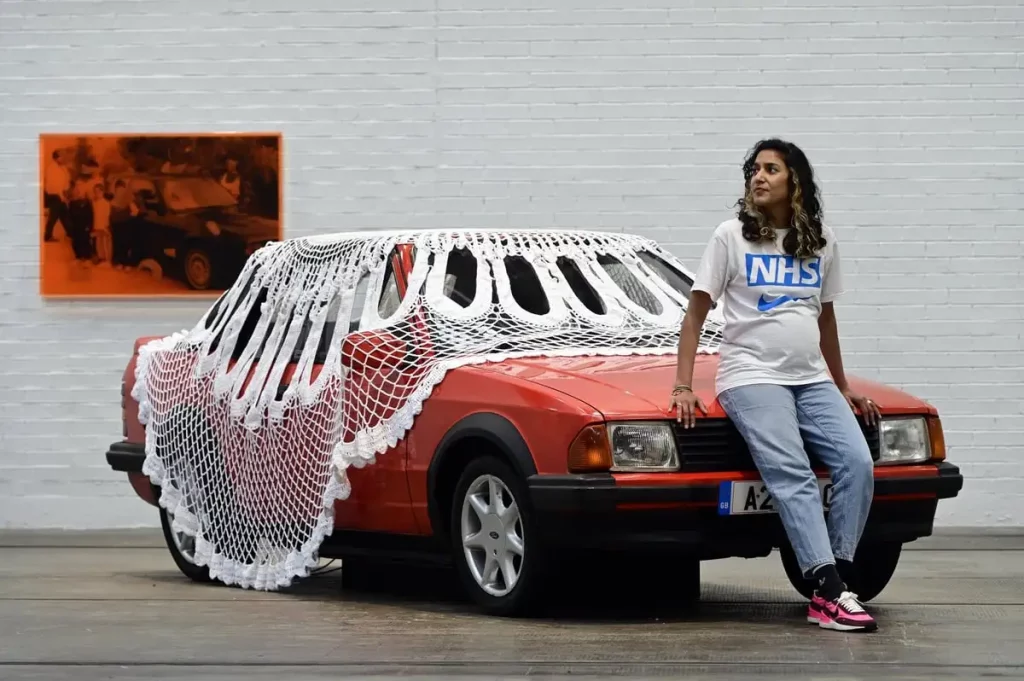
Jasleen Kaur with the central piece of her her award winning installation ‘Alter Altar’
Winning the Turner Prize
The Turner Prize ceremony, held at Tate Britain, celebrated Jasleen’s ability to transform ordinary objects into expressions of community and cultural inheritance. Presented by actor James Norton, the award highlighted her work’s innovative approach. Her installation, Alter Altar, which combines sculptures, prints, music, and everyday items, stood out for its ability to animate the mundane through sound and meaning. The solo exhibition was unveiled at the Tramway in Glasgow in 2023, exploring the intersections of personal identity and broader sociopolitical themes.
A series of kinetic sculptures prominently features worship bells, while Scottish Irn-Bru soda bottles conjures memories of cherished gurudwara meals in Glasgow. A harmonium, the instrument on which she learned devotional music from her father, sits on the floor, evoking a deeply personal connection to her history. The centrepiece that draws significant attention is a red Ford Escort draped with a hand-crocheted doily (an ornamental mat made of lace). The car represents her father’s first vehicle and his migrant aspirations, while the expansive four-meter doily intricately ties material culture to the legacies of the British Empire, the cotton trade, and the migration of labour to British textile mills post-World War II.
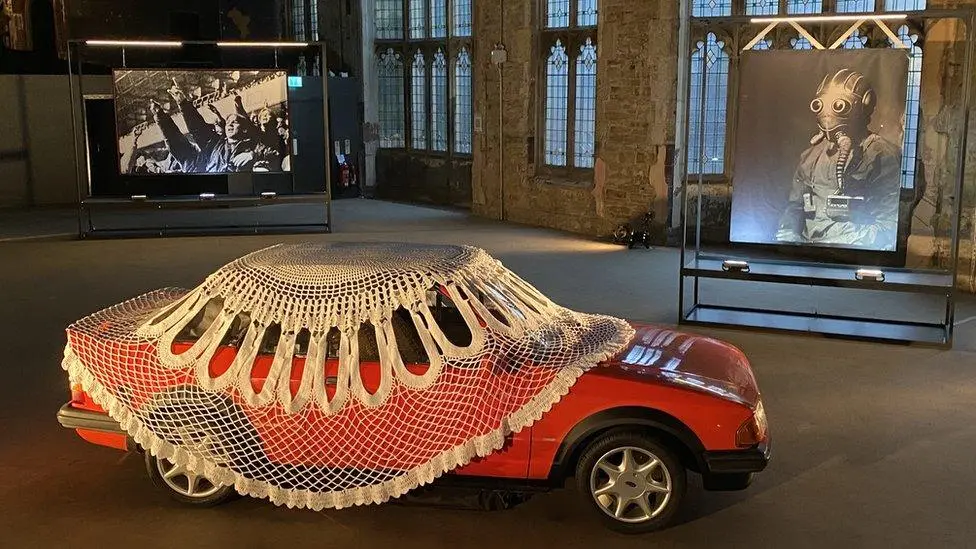
The central piece of Jasleen’s award winning installation ‘Alter Altar’
In the background, soundtracks from her childhood play—a fusion of Sufi melodies by Nusrat Fateh Ali Khan and the reggae beats of Bob Marley—creating a rich, immersive auditory experience reflecting her diverse influences. The jury praised her exhibition for its “ability to animate objects through sound and music, reflecting themes of belonging and tradition.” It wasn’t just a win for Jasleen but also a nod to the power of art in addressing complex narratives of migration, identity, and belonging.
Art rooted in fusion, history and identity
Jasleen’s journey into art is deeply tied to her Sikh upbringing in Glasgow, a city her family has called home since her great-grandfather’s migration, post-partition. Reflecting on her connection to the city, the artist who now lives in London shared, “Whenever I go back to Glasgow, it feels like I feel their presence. My dad worked in hardware shops and in cash and carries, and these were the worlds I spent a lot of time in growing up. That fundamentally influences how I make art.” This blend of heritage and environment forms the backbone of her creative process, as she seeks to renegotiate tradition and challenge accepted narratives.
“There’s this particular theory that I grew up with from the Sikh tradition, which talks about Miri Piri—the balance of the political and the spiritual,” the 38-year-old artist explained. This philosophy has always manifested in her art as a balance between personal intimacy and public commentary.
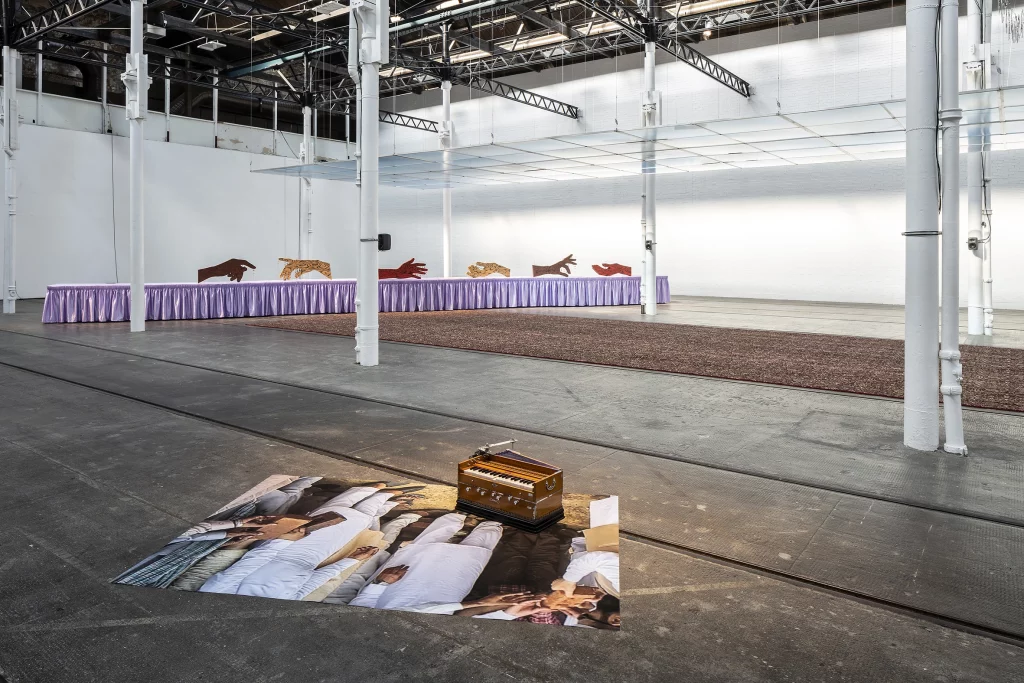
A portion of Jasleen’s award winning ‘Alter Altar’ installation
Jasleen’s work most poignantly captures a complex cultural fusion in the quest to reconnect with her heritage across continents. For example, in her 2010 degree show at the Royal College of Art in London, she presented Chai Tea Stall, a mobile tea stand featuring small clay cups. While exhibited as conceptual art, for her community, it served as a familiar and nostalgic touchstone—her way of bringing India’s vibrant tea-drinking street culture to the UK.
In 2019, she collaborated with Glasgow Women’s Library on Be Like Teflon, a publication made through conversation with women of Indian heritage living in the UK. Later, in her 2021 filmed performance piece Gut Feelings Meri Jaan, she invited Rochdale residents to engage with the ‘ethnic minorities’ section of the local history archives at the Touchstones Museum and Art Gallery, sparking conversations about identity and representation.
Sikhs in Scotland
The Sikh community in Scotland, of which Jasleen is a part of, embodies a unique identity while seamlessly blending into broader society to coexist peacefully. Sikhism in Scotland encompasses all aspects of Sikh life, dating back to the arrival of Maharaja Duleep Singh in 1855. Early migrants from the Bhat/Bhatra community settled in Glasgow and Edinburgh in the 1920s, while the majority came during the late 20th century. Despite representing a small percentage of Scotland’s population—just 0.2 percent in the 2022 census—Sikhs have maintained their cultural heritage while contributing to the fabric of Scottish society.
View this post on Instagram
One of the most significant expressions of Sikh culture in Scotland is the annual Nagar Kirtan procession held in Glasgow to celebrate Vaisakhi, a major Sikh festival. First organized in April 1992, the procession has become a cherished tradition, drawing participants from across the country. It showcases the Sikh commitment to sharing their faith and culture with fellow Scots, promoting mutual respect and understanding while enriching Scotland’s multicultural landscape.
The influence of family and tools
Jasleen Kaur credits her father’s ingenuity and her exposure to tools for shaping her practical approach to art. Recalling an incident, she shared, “Once, I wanted to prop up a ladder but failed due to a stairwell in the middle. My dad used masking tape, a paintbrush, a plant cane, and an upside-down feather duster to solve the problem.” This resourcefulness became integral to her process, where objects are reimagined not just as materials but as tools to find solutions.
Jasleen’s studio is a reflection of her upbringing, filled with items collected from Glasgow’s markets and family memories. She described, “There’s so much religious ephemera everywhere—photos, calendars, cassettes. These aren’t mass-produced histories; they tell a different version of my lineage.”
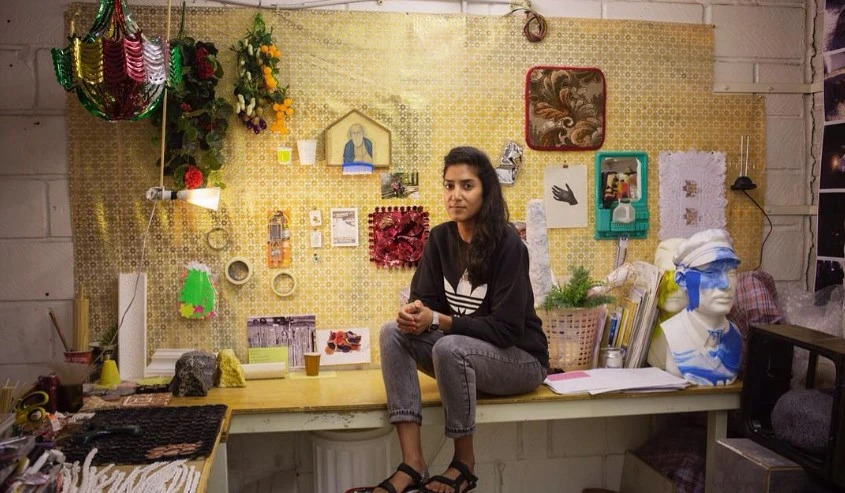
An old picture of Jasleen at her studio
The personal is political
Jasleen’s passion for preserving pluralistic traditions shines through her exploration of Sikh-Muslim devotional music. Apart from being a visual artist Jasleen is also a singer. She explained, “My singing practice today tries to salvage compositions and songs from a time when Sikhs and Muslim Rababbis would play and compose devotional music together. That time when things were more plural gives me a sense of hope for how to live now.”
Similarly, her art embodies a longing for coexistence, presenting a counter-narrative to divisive histories. By reimagining traditions through a contemporary lens, Jasleen creates a dialogue that bridges past and present, offering insights into how art can inspire societal change.
A legacy of creativity and hope
“I’m drawn to the hidden, intangible bits of history,” Jasleen reflected on her journey as a Scottish Sikh artist from the streets of Glasgow to the global stage. Winning the Turner Prize cements Jasleen Kaur’s place among contemporary art’s most innovative and transformative voices.
View this post on Instagram
For Jasleen Kaur, the Turner Prize is not just a recognition of her talent but a reminder of art’s ability to transcend boundaries. By using her creativity to redefine what it means to belong, she passes on the message that, we can build bridges and reimagine a better world.

